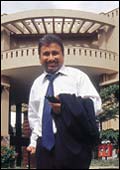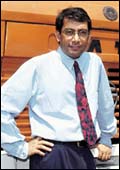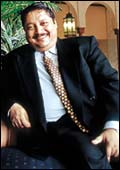|
 Few
people can boast as many blue-chip names in their resume as Kanwaljeet
Singh can. Lipton, where he turned around an animal feeds business,
Lever, and Intel, to which he took his "sales and marketing
expertise" with some effect: its presence increased from eight
Indian cities to 100 by the time he quit in August 2000. The Carlyle
Group, which raised $330 million (Rs 1,617 crore) for a Asia-focussed
it play has invested in eight Indian companies. "The start-ups
need some handholding; Kanwaljeet is the best person to do this,"
says Tony Jansz, the CEO of Carlyle Asia Venture Fund. Adds Purvi
Sheth, Director, Shilputsi, a HR consulting firm, "Singh has
the ability to generate exponential growth, compounded values and
a winning formula for the new economy." Carlyle sure thinks
so. Few
people can boast as many blue-chip names in their resume as Kanwaljeet
Singh can. Lipton, where he turned around an animal feeds business,
Lever, and Intel, to which he took his "sales and marketing
expertise" with some effect: its presence increased from eight
Indian cities to 100 by the time he quit in August 2000. The Carlyle
Group, which raised $330 million (Rs 1,617 crore) for a Asia-focussed
it play has invested in eight Indian companies. "The start-ups
need some handholding; Kanwaljeet is the best person to do this,"
says Tony Jansz, the CEO of Carlyle Asia Venture Fund. Adds Purvi
Sheth, Director, Shilputsi, a HR consulting firm, "Singh has
the ability to generate exponential growth, compounded values and
a winning formula for the new economy." Carlyle sure thinks
so.
-Venkatesha Babu
 Hema
Ravichandar Hema
Ravichandar
41, Executive Vice President, HR, Infosys
Technologies
High Tech, High Touch
Ravichandar heads the HR function at a company
that was twice named the Best Employer in India. Need we say more?
It was a meeting
that changed the fortunes of both the company and the individual.
On a bright, sunny, January morning in 1992, Hema Ravichandar, then
the #2 in Mico-Bosch's hr department, met with the two founders
of a company that boasted a turnover less than Rs 10 crore, Infosys.
Mico's turnover then was in the region of Rs 400 crore, but the
Indian Institute of Management, Ahmedabad, alum was taken up with
what N.R. Narayana Murthy and Nandan Nilekani had to say.
Today, Infosys boasts a turnover in excess
of Rs 3,000 crore and has 11,250 people on its rolls, a far cry
from the 250 it had in 1992. And along the way, the company has
become the trend-setter for industry by aggressively sharing wealth
with its employees. Nilekani vouches for Ravichandar's ability to
align hr with business needs. "The promoters always had a fundamental
philosophy of sharing wealth, but it was Hema who executed this
plan." Ravichandar herself downplays her success and says the
now-global company has to now get used to "integrating people
from different national backgrounds," and cope with attracting
and retaining "a different profile of people as we become more
of a consulting organisation". Par for the course.
-Venkatesha Babu
 Ruchir
Sharma Ruchir
Sharma
Early 30s, Executive Director, India, Morgan
Stanley Investment Management
A Passion For Markets
Sharma manages a cool $1 billion of FII and
domestic funds.
He's so young
that he refuses to give his exact age-but he does accept that he
is not yet 32. "The only reason I am in this industry is because
of my passion for markets, especially global ones," says Sharma.
That passion manifested itself (and still does) in weekly columns
for a financial paper. Madhav Dhar, one the most successful Indians
on Wall Street, and then with Morgan Stanley, read Sharma's column
and offered him a job as an associate with the investment management
firm in 1996. And the commerce graduate from Delhi succeeded Vinod
Sethi as Morgan Stanley Investment Management's Executive Director
in early 2001. Today, apart from managing $1 billion (Rs 4,900 crore)
of FII and domestic funds, Sharma covers global macro-economics
for the emerging markets investment team, and is also part of the
global asset allocation team with specific responsibility for currency
research. "Ruchir is undoubtedly one of the brightest stars
on the Indian corporate firmament," gushes Atul Vohra, Partner,
Heidrick and Struggles, a head-hunting firm. "He was the youngest
ever VP at Morgan Stanley.'' For the record, the India Investment
Fund Sharma manages was one of the best performing offshore funds
focused on India in 2001-this, despite the markets being in a bear
phase. But isn't there an old Street saw about the bear phase telling
the men from the boys?
-Roshni Jayakar
 Tiger
Tyagarajan Tiger
Tyagarajan
40, CEO, GE Capital International Services
Tiger, Tiger Burning Bright
Tyagarajan is a roaring success at GE.
Back in school
in Mumbai, classmates who couldn't pronounce his name started calling
N.V. Tyagarajan, Tiger. The name has stuck-even the guards at GECIS'
Gurgaon facility call him that-and seems strangely apt. An IIT-IIM
combo, Tyagarajan joined GE in 1994 after stints in Pond's and Citibank.
Although he was involved in the launch of Countrywide, GE's consumer
finance business, it was at GECIS, a back-office to GE operations
around the world that Tiger came into his own. "It was amazing
to see something grow from 700 people to 10,000," says Tyagarajan
who was named CEO of the business in 1999. His years at IIT, Tyagarajan
says, taught him to approach problems systematically; IIM introduced
him to the concept of teams; Ponds gave him insights into the mind
of the consumer, and Citibank endowed him with a perspective of
the banking business. As one would expect with someone who can rattle
off his take-aways from earlier jobs, "discussions with him
are always based on logic, not opinions," says Mudit Saxena,
Centre of Excellence Leader, GECIS. The only negative thread in
this tapestry: with a name like Tiger, the man isn't too hot on
golf.
-Abha Bakaya
 Nirvik
Singh Nirvik
Singh
39, CEO, Grey Worldwide India
The Genial Control Freak
Singh is one reason Grey is still around in
India.
When Nirvik Singh
was 18, he lost both his parents in a span of six months. At 21,
the commerce graduate from St. Xaviers College, Kolkata, was a tea
auctioneer. At 25, he was an account supervisor at HTA. At 26, he
was heading Trikaya Grey's Kolkata branch. Then tragedy struck again:
Trikaya's founder-CEO and Singh's mentor Ravi Gupta died in 1997.
"There were reports every day about how we were closing down,"
recollects Singh. But he persevered: 44 clients and 200 employees
were shown the door and the agency's resources were refocused on
its top 50 clients. Today, Grey (the parent's holding has increased
to 100 per cent) boasts revenues of Rs 283 crore and Singh oversees
the agency's operations in Sri Lanka, Mauritius, and Bangladesh.
A self-confessed control freak, Singh is now focusing all his efforts
at transforming Grey into an integrated marketing communications
company. "There's nothing like boarding school to teach you
to fend for yourself," laughs the Lawrence School, Sanawar,
alumnus.
-Abir Pal
 Suresh
Vaswani Suresh
Vaswani
42, President, Wipro Infotech
Driven In Bangalore
It's hard to be a tech biggie in the domestic
market, but Wipro Infotech has done just that.
First the facts:
Wipro Infotech contributes nearly a quarter of Wipro Ltd's Rs 3,400
crore turnover; and it is hard being a hardware and systems integration
company focused on the domestic market. Wipro Infotech has done
just that, and succeeded. If Suresh Vaswani can legitimately take
the credit for the feat (it is nothing short of that): he turned
around Wipro's hardware business and helped the division he heads
make an entry into the systems integration and it services markets
in Asia-Pacific and West Asia. Today, Wipro Infotech addresses the
two biggest emerging markets, China and India. That may seem like
a large portfolio, but Vaswani, says Ashok Soota, his former CEO
at Wipro and now the CEO of Mindtree, "has legendary multi-tasking
skills, and the ability to convert problems into opportunities".
With most Indian it services majors veering around to the opinion
that India and China represent the next big frontier for growth,
Vaswani sure is sitting on a goldmine of an opportunity.
-Venkatesha Babu
 Ravi
Venkatesan Ravi
Venkatesan
40, Chairman, Cummins India and Managing
Director, Tata Cummins
Truck Driving Man
A lifer to date, Venkatesan is a star in the
global Cummins system.
Call it an obsession
with one company: Ravi Venkatesan's first brush with Cummins was
during a student (he is an engineer from IIT, Mumbai) internship;
after completing a masters programme from Purdue, he chose Cummins
over gm; four years later he went to Harvard for a company-sponsored
MBA, and made extra money writing articles on outsourcing for the
Harvard Business Review; and after graduating, he again chose Cummins,
this time over the Boston Consulting Group. Cummins returned the
favour by naming him President in charge of global outsourcing.
In 1996, when Venkatesan arrived in India to
revive the fortunes of Tata Cummins, he thought it would be "a
great option for a few years". Six years on, TCL is the subject
of a Harvard Business school case-study, exports have doubled, the
company has entered the lucrative truck fleet management business,
and Venkatesan has become chairman of all of Cummins' Indian ventures.
"I have already done what I planned to do in my entire working
life," admits a candid Venkatesan who is now eyeing a group
turnover of Rs 5,000 crore by 2005. A recent vacation at the Isha
ashram in Trivandrum, confesses Venkatesan, has got him thinking
on "the larger goals in life". But the Rs 5,000 crore
goal will remain.
-Seema Shukla
 N.
Srinath N.
Srinath
40, Director (Operations), VSNL
Man In The Hot Seat
He shot into the limelight when he rolled out
the Tatas' telecom services. Now he's got to perform a miracle with
VSNL.
If this were a
list of executives with the most challenging mandates, 40-year-old
Narasimhan Srinath would stroll in effortlessly. Five months after
acquiring 25 per cent in the public sector telecom giant, VSNL stands
the risk of losing its international long-distance business-which
brings in close to 90 per cent of revenues, via MTNL and BSNL-to
private players. Srinath is hesitant to sign the interconnect agreement
with MTNL and BSNL because of the skewed revenue-sharing terms.
But then this isn't a piece on VSNL. It's about
Srinath, the 15-year veteran of the Tata group, who has the very
enviable task of making VSNL fit as nicely as possible into the
Tatas' grand telecom blueprint. And if credentials were all it took
to turn around corporate fortunes, the fast-talking Srinath-a product
of the Tata Administrative Services (TAS)-would be just the messiah
Ratan Tata prayed for. Tata, for his part, should know exactly what
the mechanical engineer from IIT (Madras) is capable of: he served
as Executive Assistant to the Chairman between December 1988 and
mid-1992.
After pocketing his management degree from
IIM (Calcutta), Srinath wasn't too sure of what he wanted to do.
What he was fairly sure about was that he wanted to be associated
with a business group scouting for opportunities in emerging technologies.
At the TAS interview, a director on the panel convinced Srinath
that the group was eyeing sunrise areas like telecom equipment and
computer hardware.
As a TAS probationer, Srinath did stints in
Tata Honeywell and Nelco, before moving on to Tata's office. By
June 1992, Srinath was a part of the four-man team that put together
Tata IBM (earlier Tata Information Systems). Three years ago, Srinath
was one of the driving forces behind the roll out of Tata Teleservices'
basic telecom services in Andhra Pradesh. By December 2000, Srinath
moved as the CEO of Tata Internet Services. But even Srinath will
agree the seat of Director (Operations) VSNL is the hottest he's
ever slipped into yet.
-Brian Carvalho
Numbers
don't lie
Ha! Still, if you believe in them, here are
some `statistical learnings' from the list.
 You
can't go wrong with an MBA 16 of the 25 have one,
but you can very well succeed without one too. Morgan Stanley's
Ruchir Sharma and Grey's Nirvik Singh are both just graduates. Just? You
can't go wrong with an MBA 16 of the 25 have one,
but you can very well succeed without one too. Morgan Stanley's
Ruchir Sharma and Grey's Nirvik Singh are both just graduates. Just?
A long-stint with a
company helps
Almost everyone on the listing-except Barista's Ravi Deol, and E&T's
Bobby Parikh-has spent more than two years at their present jobs.
Indeed, six are lifers.
The Engineering-MBA
combo works...
...especially if it is an IIT-IIM one, but any B-school outside
India will do as well. Six of the 25 have this.
 Grasp
every start-up challenge you can get Grasp
every start-up challenge you can get
First the numbers: 13 of the 25 have been involved in start-up
situations. Once you succeed in that context, there's no holding
back your career. Just ask the Tata Group's N. Srinath.
 If
you can't get start-up experience try for turnarounds If
you can't get start-up experience try for turnarounds
That's right: you turn things around and you are a star.
Why do you think people keep speaking about Philip's Rajeev Karwal.
Again, six of the 25 have this on their CVS.
Healthy body, healthy
mind
Yes, we know. Some of the people whose photographs appear
on the previous 11 pages don't look like they have ever exercised
(relax, we're not taking names). Still, 11 of the 25 do exercise.
DSP Merrill Lynch's Amit Chandra puts in an hour-and-half everyday
in the gym.
 Finally,
kill yourself working Finally,
kill yourself working
How do you think the 25 got there: at least 18 of them work over
60 hours a week. Cummins' Ravi Venkatesan works six-and-half days
a week and travels 25 days a month.
Methodology
How We Did It
The methodology behind the listing.
 |
| The Panel (L to R): Accord Group's Sonal
Agarwal, Stanton Chase's R. Suresh, Shilputsi's Purvi Sheth,
Heidrick & Struggles' Atul Vohra, and Ma Foi's K. Pandiarajan |
Companies are loath
to give out names of their stars, lest they be poached. So, when
BT first came up with the idea of profiling 25 of India's rising
stars, it seemed destined to be that-just a good idea. Fortunately,
there is a community that tracks executives, head-hunters. We invited
the CEOs of all of India's leading head-hunting firms to participate
in this exercise. Five, Stanton Chase, Heidrick & Struggles,
Accord Group, Shilputsi, and Ma Foi agreed. As a first step, each
of the firms sent a shortlist to BT. On August 29, head-hunters
from the five firms-Stanton Chase CEO R. Suresh, Ma Foi CEO K. Pandiarajan,
Heidrick & Struggles Partner, Atul Vohra, Shilputsi Director,
Purvi Sheth, and Accord Group Director, Sonal Agrawal-met in BT's
office in Delhi for a day long session to discuss the names. The
discussion was moderated (and the entire exercise co-ordinated)
by BT's Assistant Editor Seema Shukla, assisted by BT correspondent
Abha Bakaya. The discussion focussed on the individual's:
- Track record and consistency
- Progress through the ranks
- Contribution to the organisation's bottomline
and other objectives
- Ability to deal with start-up, turnaround,
and/or fast-growth situations
- Ability to align individual brilliance with
the organisation's goals
While the original idea was to look for people
under 40, the absence of enough 'hot young executives' who fit this
criterion, forced us to relax the age-limit: thus, 42 was taken
as the cut-off age. However, that did mean leaving out execs who
would have otherwise been shoo-ins: such as Pepsi's Vibha Paul Rishi,
43, and Color Plus' Kailash Bhatia, 46.
1
2 3
|

